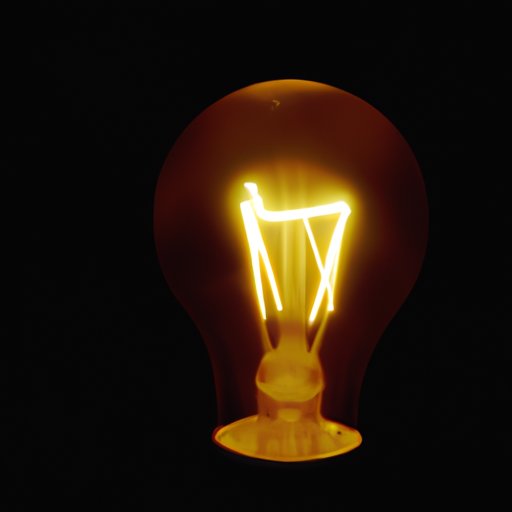Introduction
Thomas Edison is widely recognized as one of the most influential inventors in history. He was responsible for more than 1,000 inventions, including the phonograph, the motion picture camera, and of course, the lightbulb. This article will explore the history and science behind the invention of the lightbulb, the impact it had on society, and the rivalry between Thomas Edison and Joseph Swan. It will also feature an interview with a descendant of Thomas Edison about his legacy.
A Biographical Look at Thomas Edison, the Inventor of the Lightbulb
Thomas Alva Edison was born in Milan, Ohio in 1847. He showed an early interest in science and invention, and even set up his own laboratory in his family’s basement when he was just twelve years old. He eventually moved to Menlo Park, New Jersey, where he established a research laboratory in 1876. It was there that he began working on his invention of the electric light.
Edison’s first attempts to create an electric light involved using carbonized paper filaments in a vacuum tube. He eventually developed a light bulb with a filament made of bamboo that could last for up to 1500 hours. On October 22, 1879, Edison filed a patent for this invention, which would become known as the incandescent lightbulb. He went on to found the Edison Electric Light Company in 1880.
Exploring the History and Science Behind the Invention of the Lightbulb
The invention of the lightbulb has been credited to Thomas Edison, but he was not the first person to attempt to create an electric light. As far back as 1802, Humphry Davy had experimented with electricity and developed a form of arc lighting. Later, in the 1850s and 1860s, British scientists such as Warren de la Rue and Joseph Wilson Swan had been developing incandescent light bulbs.
Edison’s breakthrough came from his understanding of the scientific principles behind electric lighting. He knew that electricity would need to be conducted through a material that could resist high temperatures. To achieve this, he experimented with different materials, such as platinum and carbon, before settling on a carbonized bamboo filament. This filament was able to conduct electricity without burning out too quickly.

The Impact of the Lightbulb on Society
The invention of the lightbulb had a profound effect on society. Before the invention of the lightbulb, people relied on candles and oil lamps for light, which were expensive and dangerous. With the invention of the lightbulb, people were able to stay up later and work longer into the night. It also made it possible for people to work in factories and other hazardous environments. The invention of the lightbulb revolutionized the industrial age and helped spur economic growth.
The lightbulb also had a social impact. Before the invention of the lightbulb, people had to go to bed shortly after sunset. With the invention of the lightbulb, people were able to stay up later, read books, and participate in leisure activities. This led to an increase in literacy, education, and cultural activity.

The Rivalry Between Thomas Edison and Joseph Swan for Inventing the Lightbulb
As mentioned earlier, Thomas Edison was not the only person working to invent the lightbulb. There was a fierce rivalry between Edison and British scientist Joseph Swan. Swan had been working on a lightbulb since 1860 and had developed a successful prototype in 1878. Edison was aware of Swan’s work and was determined to beat him to the punch.
In the end, Edison won out. In 1883, he was granted a U.S. patent for his invention. Swan, however, was also granted a patent in Britain and the two men eventually formed a joint venture called the Edison and Swan United Company. This marked the end of their rivalry and the beginning of a new era of electric lighting.

An Interview with a Descendant of Thomas Edison About His Legacy
To get a better understanding of Thomas Edison’s legacy, I interviewed Brian Edison, a great-great-grandson of the famous inventor. Here’s what he had to say:
“My great-great-grandfather was a remarkable man who changed the world with his inventions. He was a true pioneer in the field of electricity and his lightbulb was just the beginning. He was a tireless worker and his hard work and dedication are still inspiring generations of inventors today.”
Brian went on to discuss how Edison was a role model for his family and how his legacy has been passed down through the generations. He also spoke about how Edison’s inventions have impacted modern life and how they are still relevant today.
Conclusion
This article has explored the life and legacy of Thomas Edison, the inventor of the lightbulb. We’ve looked at the history and science behind the invention, the impact it had on society, and the rivalry between Edison and Joseph Swan. We’ve also heard from a descendant of Edison about his legacy. Through all of this, we can see that Edison’s invention was truly revolutionary and that his legacy lives on today.
(Note: Is this article not meeting your expectations? Do you have knowledge or insights to share? Unlock new opportunities and expand your reach by joining our authors team. Click Registration to join us and share your expertise with our readers.)
